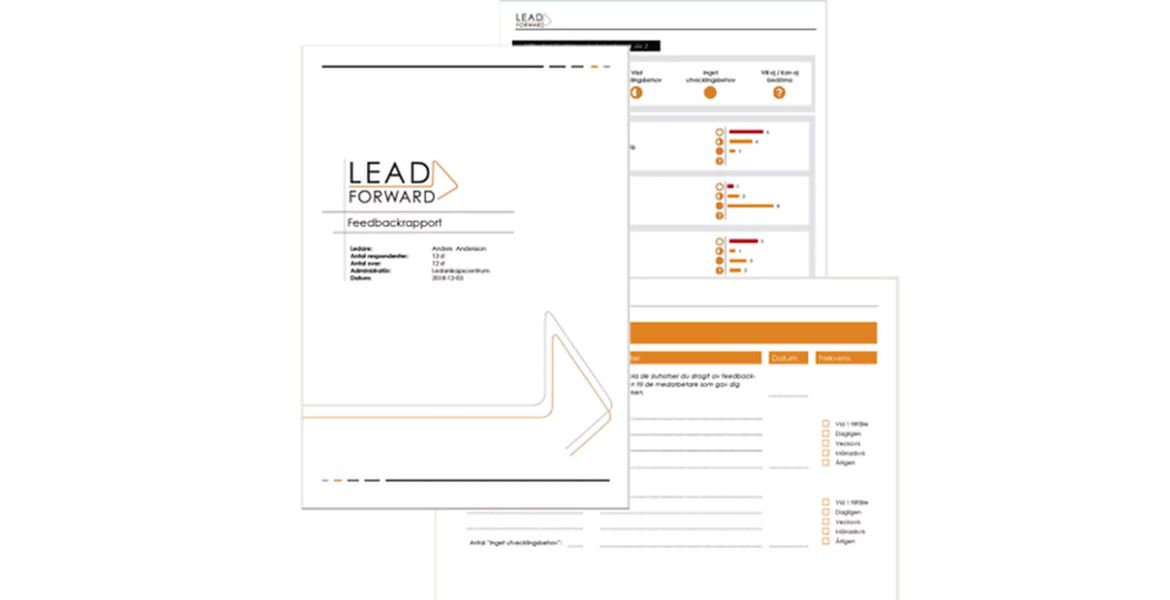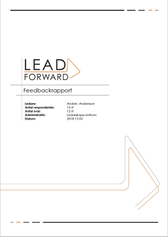
Den ledarskapsmodell som ligger till grund för Lead Forward är den så kallade Full Range Leadership Model (FRLM). Detta är den modell som legat till grund för flest vetenskapliga studier inom forskningen på ledarskap och den modell som fram till dags dato kan sägas ha erhållit mest konsekvent stöd avseende vad som är ett väl fungerande ledarskap. Tusentals studier har genomförts på FRLM eller på delar av den, vilket renderat en mängd så kallade meta-analyser som slagit fast modellens validitet.

Balwant, P. T. (2016.). Transformational instructor leadership in higher education teaching: A meta-analytic review and research agenda. Journal of Leadership Studies, 9(4), 20–42.
Banks, G. C., Davis, K., Gardner, W. L., & Guler, C. E. (2016). A meta-analytic review of authentic and transformational leadership: A test for redundancy. The Leadership Quarterly, 27(4), 634–652. Banks, G. C., Engemann, K. N., Williams, C. E., Gooty, J., Davis, K., & Medaugh, M. R. (2017). A meta-analytic review and future research agenda of charismatic leadership. The Leadership Quarterly, 28(4), 508–529.
Bektas, F. (2015). The effect of educational leadership on students’ achievement: A meta-analysis study, Asia Pacific Education Review, 16, 79–93.
Bono, J. E., & Judge, T. a. (2004). Personality and transformational and transactional leadership: A metaanalysis. Journal of Applied Psychology, 89(5), 901–10.
Bossche, P. Van Den, Hoven, M., & Klink, M. Van Der. (2018). When leadership powers team learning: A metaanalysis. Small Group Research, 49(4), 475–513.
Burke, C. S., Stagl, K. C., Klein, C., Goodwin, G. F., Salas, E., & Halpin, S. M. (2006). What type of leadership behaviors are functional in teams? A meta-analysis. The Leadership Quarterly, 17(3), 288–307.
Ceri-booms, M., Lucian, P., & Oerlemans, L. A. G. (2017). Task and person-focused leadership behaviors and team performance: A meta-analysis, Human Resource Management Review, 27, 178–192.
Chiaburu, D. S., Smith, T. A., Wang, J., & Zimmerman, R. D. (2014). Relative importance of leader influences for subordinates’ proactive behaviors, prosocial behaviors, and task performance. Journal of Personnel Psychology, 13(2), 70–86
Christian, M. S., Bradley, J. C., Wallace, J. C., & Burke, M. J. (2009). Workplace safety: A meta-analysis of the roles of person and situation factors. Journal of Applied Psychology, 94(5), 1103–1127.
Deinert, A., Homan, A. C., Boer, D., Voelpel, S. C., & Gutermann, D. (2015). Transformational leadership subdimensions and their link to leaders’ personality and performance. The Leadership Quarterly, 26(6), 1095– 1120.
Derue, D. S., Craig, J., Wellman, E., & Humphrey, S. E. (2011). Trait and behavioral theories of leadership: An integration and meta-analytic test of their relative validity. Personnel Psychology, 64(1), 7-52.
Eagly, A. H., Johannesen-schmidt, M. C., Kelly, S., Liebman, J., Jaganathan, A., & Wood, W. (2003).
Transformational, transactional, and laissez-faire leadership styles: A meta-analysis comparing women and men. Psychological Bulletin, 129(4), 569–591.
Jackson, T. A., Meyer, J. P., & Wang, X. F. (2013). Leadership, commitment, and culture: A meta-analysis. Journal of Leadership & Organizational Studies, 20(1), 84–106.
Joseph, D. L., Dhanani, L. Y., Shen, W., Mchugh, B. C., & Mccord, M. A. (2015). Is a happy leader a good leader? A meta-analytic investigation of leader trait affect and leadership. The Leadership Quarterly, 26(4), 557–576.
Judge, T. A., & Piccolo, R. F. (2004). Transformational and transactional leadership: A meta-analytic test of their relative validity. Journal of Applied Psychology, 89(5), 755–768.
Koh, D., Lee, K., & Joshi, K. (2019). Transformational leadership and creativity: A meta-analytic review and identification of an integrated model. Journal of Organizational Behavior (Online first).
Leong, L. Y. C., & Fischer, R. (2011). Is transformational leadership universal? A meta-analytical investigation of Multifactor Leadership Questionnaire means across cultures. Journal of Leadership & Organizational Studies, 18(2), 164–174.
Lowe, K. B. (1996). Effectiveness correlates of transformational and transactional leadership: A meta-analytic review of the MLQ literature. The Leadership Quarterly, 7(3), 385–425.
Montano, D., Reeske, A., Franke, F., & Hüffmeier, J. (2017). Leadership, followers’ mental health and job performance in organizations: A comprehensive meta-analysis from an occupational health perspective, Journal of Organizational Behavior, 38, 327–350.
Ng, T. W. H. (2017). Transformational leadership and performance outcomes: Analyses of multiple mediation pathways. The Leadership Quarterly, 28(3), 385–417.
Piccolo, R. F., Bono, J. E., Heinitz, K., Rowold, J., Duehr, E., & Judge, T. A. (2012). The relative impact of complementary leader behaviors: Which matter most? The Leadership Quarterly, 23(3), 567–581.
Simons, T., Leroy, H., Collewaert, V., & Butler, E. N. (2015). How leader alignment of words and deeds affects followers: A meta-analysis of behavioral integrity research. Journal of Business Ethics, 132, 831–844.
Wang, G., Oh, I., Courtright, S. H., & Colbert, A. E. (2011). Transformational leadership and performance across criteria and levels: Ameta-analytic review of 25 years of research. Group and Organization Management, 36, 223–270.
Utöver att Lead Forward har sin bas i Full Range Leadership Model så är konceptet utformat i enlighet med den forskning som finns på metoder för ledarskapsutveckling. Framförallt är Lead Forward baserat på den forskning som riktat in sig på vad som åstadkommer faktisk förändring och tillämpning av beteenden i samband med ledarskapsutvecklande insatser, något som brukar kallas för transfer av träning. Denna forskningsmängd har slagit fast att insatser som har god effekt på transfer har ett antal gemensamma nämnare, till exempel:
Arthur Jr. W., Bennet Jr. W., Edens, P. S., & Bell, S. T. (2003). Effectiveness of Training in Organizations: A Meta- Analysis of Design and Evaluation Features, 88(2), 234–245.
Burke, L. A., & Hutchins, H. M. (2007). Training Transfer: An Integrative Literature Review. Human Resource Development Review, 6(3), 263–296.
Day, D. V. (2001). Leadership development: A review in context, Leadership Quarterly, 11(4), 581–613.
Lacerenza, C. N., Reyes, D. L., Marlow, S. L., & Joseph, D. L. (2017). Leadership training design, delivery, and implementation: A meta-analysis, Journal of Applied Psychology, 102(12), 1686–1718.
Salas, E., Tannenbaum, S. I., Kraiger, K., & Smith-Jentsch, K. a. (2012). The Science of Training and Development in Organizations: What Matters in Practice. Psychological Science in the Public Interest, 13(2), 74–101.